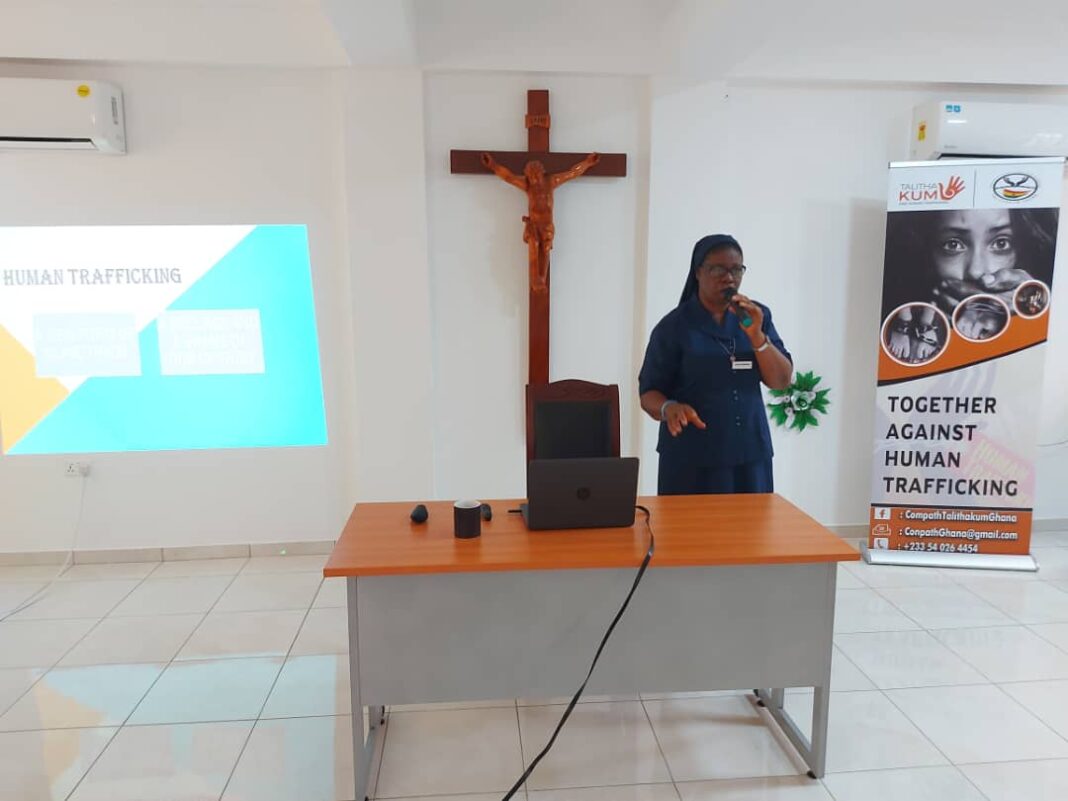Members of the Talitha Kum Network in Ghana, Nigeria and Burkina Faso are currently in Accra, Ghana participating in a five-day Workshop focused on Collaboration and Networking, Management of Diversity and Conflict as well as device ways of fighting the menace of human trafficking.
One may ask what is Talitha Kum? It is an International Network of Consecrated Life Against Trafficking in Persons that responsibly and creatively implements the decision taken in 2001 by the International Union of Superiors General (UISG) Plenary Assembly: “to work in solidarity with one another within our own religious communities and in the countries in which we are located to address insistently at every level the abuse and sexual exploitation of women and children with particular attention to the trafficking of women which has become a lucrative multinational business.”
Talitha Kum is part of the UISG and coordinates the anti-trafficking efforts of Religious Sisters, facilitating networking, communication and formation, according to the strategic planning of the UISG and the Social Teaching of the Catholic Church.
The members of Talitha Kum are:
• Inter-congregational Sister-led networks, organized primarily at the national level, involving religious men and all people of good will who share the vision of Religious People regarding anti-trafficking;
• on-the-ground oriented,
• linked to the national Conference Association of Major Superiors
Talita Kum is an expression that is found in the Gospel of Mark (5, 41). The words, translated from the Aramaic mean “young girl, I say to you, arise.” These words are addressed by Jesus to the twelve year old daughter of Jairus, who lay apparently lifeless. After uttering these words, Jesus took her by the hand and she immediately got up and walked.
The worldwide network of consecrated life committed against trafficking of people chose the expression “Talitha Kum” to define their identity. The expression “Talitha Kum” has the transformative power of compassion and mercy, which awakens the deep desire for dignity and life which may be asleep and injured by the many forms of exploitation.
Trafficking in persons is a complex and multidimensional phenomenon, wounding tens of millions of individuals and the entire human society. The expression Talitha Kum is an invitation to all to stand up to counter with our voice, our actions, our daily choices and our lives everything that promotes and supports trafficking in persons. We denounce the arrogance and violence of economic and financial power when it acts against the dignity of the person.
Those who adhere to the values of Talitha Kum are committed to be neighbour to those who suffer the serious consequences of trafficking in persons, men, women, children, and families.
The activities and projects of Talitha Kum are aimed at all those who are robbed of their dignity and deprived of liberty, regardless of their lifestyle, race, religion, economic or sexual orientation.
The members of Talitha Kum living and bearing witness to Christian values, dialogue with and show respect for members of the different religious traditions and for non-believers.
Talitha Kum Mission has a mission to end human trafficking through collaborative initiatives focused around prevention, protection, social reintegration and rehabilitation of survivors, partnership and advocacy, promoting actions that affect the systemic causes.
As consecrated women, they live in solidarity with their brothers and sisters who suffer the consequences of the evil of human trafficking. They share their lives with those who are in situations of social vulnerability and risk of trafficking.
They accept the invitation to take the side of those who are discriminated against, exploited and victimized by modern slavery, breaking the silence, indifference and conformism that support human trafficking and all forms of commodification of life. They value and promote collaboration and partnership with all organizations that are committed to eliminating trafficking in persons and its causes.
History
Female Religious Life has been engaged for centuries in activities against slavery and trafficking in persons. Nevertheless, the seeds that gave birth and growth to Talitha Kum were planted in the late 1990s when consecrated persons realized the importance and value of joining forces and resources in the development of an integrated network.
In 1998, the International Union of Superiors General (UISG), addressed by Sr. Leah Ackerman, MSOLA, accepted the invitation to greater collaborative efforts against trafficking in persons and formed a study group on the topic within the Commission for Justice, Peace and the Integrity of Creation.
This group produced training materials which led to greater awareness within congregations of women religious and to more joint efforts against trafficking. The most important of these items was the Tool Kit : “Trafficking of women, girls and children – Information and material for work” which was published in 2003 in collaboration with Caritas International.
Between 2004 and 2008 the International Union of Superiors General, in collaboration with the International Organization for Migration, developed a training program that led to the establishment of several regional networks in Italy, Albania, Nigeria, Romania, Thailand, Santo Domingo Brazil, Portugal, Philippines, South Africa. Sr. Bernadette Sagma, FMA, project coordinator UISG and Sr. Eugenia Bonetti, MC Italian network, contributed significantly to the project.
In 2009, during the first global meeting of networks arising from the training sessions, a proposal was made to create Talitha Kum as the International Network of Consecrated Life Against Trafficking with a representative at the UISG. Since its foundation.
Talitha Kum continued to promote courses for the training of new local networks and to encourage networking and collaboration with other organizations working against trafficking in persons.



